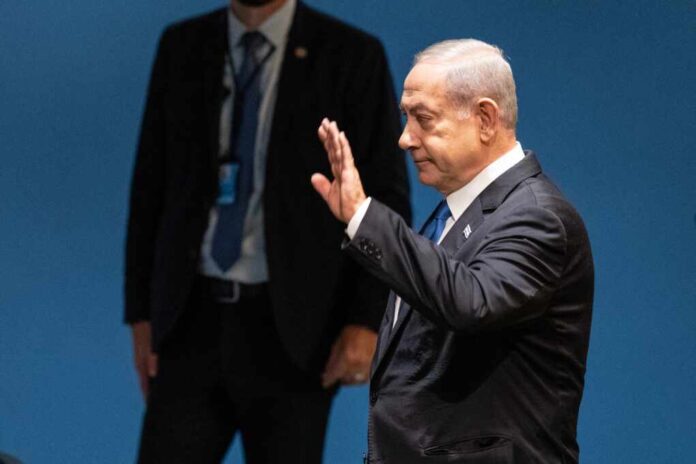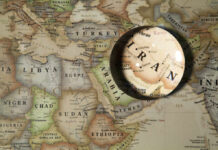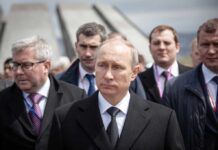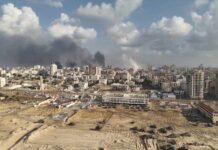
Israel unleashes massive assault on Iran’s nuclear program with “Operation Rising Lion,” striking over 100 sites with 200 fighter jets and covert operations, while bracing for potential retaliation.
At a Glance
- Israel launched “Operation Rising Lion” targeting Iran’s nuclear and missile facilities, including the critical Natanz uranium enrichment site
- The operation involved 200 fighter jets and Mossad covert operations, killing key Iranian military officials and nuclear scientists
- Prime Minister Benjamin Netanyahu vowed to continue strikes “for as many days as it takes” to eliminate Iran’s nuclear weapons capability
- Israel has declared a state of emergency while Iran has promised “bitter and painful” retaliation
- The International Atomic Energy Agency confirmed damage at Natanz and is monitoring for radiation
Israel’s Unprecedented Military Operation
Israel has launched its most extensive military operation against Iran in decades, striking deep within Iranian territory to cripple the Islamic Republic’s nuclear program. The operation, codenamed “Rising Lion,” targeted over 100 nuclear and missile facilities using 200 fighter jets and sophisticated covert operations carried out by Mossad.
Israeli forces specifically hit key sites including the Natanz uranium enrichment facility, which has been at the center of international concerns about Iran’s nuclear ambitions for years. Significant damage has been reported at multiple strategic locations across Iran.
The strike was meticulously planned with deception tactics to maintain secrecy. Israeli officials deliberately misled the public about the cabinet meeting’s agenda before the operation. Mossad operatives had pre-positioned explosive drones near Iranian missile systems, which were activated during the coordinated assault.
The comprehensive nature of the attack has reportedly set back Iran’s nuclear program by years and eliminated several high-ranking military officials, including Generals Mohammad Bagheri, Hossein Salami, and Amir Ali Hajizadeh.
The Israeli strikes do not appear to have targeted Iran’s nuclear infrastructure. Early indications have suggested that Israel attempted to assassinate senior figures in the Iranian regime — similar to the dismantling of Hezbollah https://t.co/75hU3PVYUr
— The Times and The Sunday Times (@thetimes) June 13, 2025
Netanyahu’s Bold Declaration
In a televised address following the operation, Prime Minister Benjamin Netanyahu made Israel’s intentions clear. He declared that the strikes would continue “for as many days as it takes” to eliminate Iran’s nuclear weapons capability. This definitive stance represents a significant escalation in Israel’s approach to the Iranian threat, moving from defensive posturing to proactive dismantling of Iran’s nuclear infrastructure. Netanyahu’s administration has emphasized that Israel struck “at the heart of Iran’s nuclear enrichment program,” directly targeting the facilities most critical to weapons development.
“We struck at the heart of Iran’s nuclear enrichment programme”, said Israeli Prime Minister Benjamin Netanyahu.
The operation has exposed what many analysts have long suspected: Iran’s claims of peaceful nuclear development were misleading. For years, Tehran insisted its nuclear program was solely for civilian energy purposes, but the targets chosen by Israel indicate military dimensions to the program. The Israeli government has declared a state of emergency in anticipation of Iranian retaliation, implementing increased security measures across the country and preparing defensive systems for potential missile attacks.
IDF Spokesperson press briefing:
"We are continuing with intense combat—both defensively and offensively.
As I speak, we are striking across Iran as part of Operation “Rising Lion”.
These strikes are being carried out to meet the operation’s objective: eliminating the…
— ILRedAlert (@ILRedAlert) June 14, 2025
Iran’s Response and International Implications
Iran has responded with immediate condemnation and promises of severe retaliation. Supreme Leader Ayatollah Ali Khamenei warned that Israel has set itself up for “a bitter and painful fate.” Initial drone barrages have already been launched toward Israeli territory, though many were intercepted. Iranian casualty reports indicate at least 95 wounded and several killed in missile site explosions. Tehran has accused the United States of indirectly enabling the strikes, increasing tensions throughout the region.
“With this crime, the Zionist regime has set itself for a bitter and painful fate, and it will definitely receive it.” said Iran’s Supreme Leader Ayatollah Ali Khamenei.
The International Atomic Energy Agency has confirmed damage at the Natanz facility and is conducting radiation monitoring in the area. Despite the extensive damage to its nuclear infrastructure, Iran maintains strong alliances with Russia, China, and North Korea, which may provide assistance in rebuilding efforts. The conflict has already produced economic ripple effects, with Brent crude prices spiking and airspace restrictions implemented across the Middle East. Both nations remain on high alert as concerns mount about the potential for wider regional conflict.
ATTENTION!
Thread 1 of 2:
The current military situation in the Middle East involving Israel (IS) and Iran (IR) is volatile & marked by a significant escalation in direct conflict between both nations.
Background: The last 48-72 hrs escalated when Israel launched a large-scale…
— General Mike Flynn (@GenFlynn) June 14, 2025
U.S. Position and Strategic Implications
Pressure is mounting on the United States to increase support for Israel’s defensive strategy. Security experts are urging Washington to provide enhanced intelligence sharing, munitions resupply, and missile defense systems to help Israel withstand potential Iranian counterattacks. The Biden administration has not yet issued a comprehensive response to the operation, though initial statements have emphasized support for Israel’s right to self-defense while urging restraint to prevent further escalation in the region.
Military analysts suggest that Israel’s operation has accomplished what years of diplomatic efforts and sanctions failed to achieve: a significant setback to Iran’s nuclear capabilities. The tactical success of Operation Rising Lion demonstrates Israel’s intelligence and military prowess, particularly its ability to penetrate deep into hostile territory with minimal losses. However, the long-term strategic implications remain uncertain as both nations appear poised for continued confrontation, raising concerns about stability throughout the Middle East in the coming months.

























